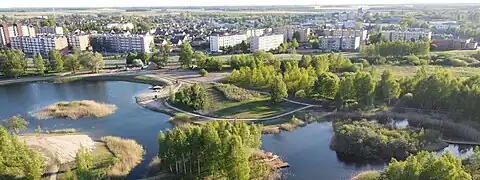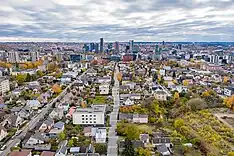
In Lithuania, there are 103 cities (in Lithuanian: singular – miestas, plural – miestai). The term city is defined by the Parliament of Lithuania as a compact urban area with more than 3,000 people, of whom at least two-thirds work in the industry or service sector. Settlements with a population of less than 3,000 but with historical city status are still considered to be cities. Smaller settlements are called miestelis (plural miesteliai) which is translated as "towns". Even smaller settlements (villages) are called kaimas (plural kaimai). Often the official status is not clear and people refer to both towns and villages as gyvenvietė (plural gyvenvietės) which in essence means settlement.
The cities started to form in the 13th–14th centuries together with the Grand Duchy of Lithuania. The first to receive city rights was Klaipėda. According to medieval law, a city could have its own fairs, taverns, guilds, courts, etc. Some former cities lost their status and are now just towns or villages, for example Kernavė and Merkinė. Most of the cities in Lithuania were established before the 18th century. Their location is mostly determined by trade and transportation routes. Some of the newer cities grew because of railroad construction, for example Kaišiadorys, Vievis, Radviliškis, Ignalina and Mažeikiai. In the 20th century, cities grew next to big industrial centers, for example Visaginas, Elektrėnai and Naujoji Akmenė. Five cities (Birštonas, Druskininkai, Neringa, Palanga and Anykščiai) have a special resort status.
Most of the cities are small. There are only 14 cities with a population of more than 20,000. Cities are quite evenly spread out through the territory of Lithuania. At the 2001 census 66.7% of the population lived in cities, and the percentage is growing. During the 2021 census it increased to 68.2% of population.
Cities with over 50,000 inhabitants
| # | CoA | City | Pronunciation | Population | Change) | Granted city rights |
County | Municipalities in urban area | Urban area estimate (2020) | |
|---|---|---|---|---|---|---|---|---|---|---|
| (2021) | (2001) | |||||||||
| 1 | Vilnius | Listen • Info | 546,155 | 554,281 | −1.47% | 1387 | Vilnius County | Vilnius City Municipality Vilnius District Municipality | 700,725 | |
| 2 | Kaunas | Listen • Info | 298,753 | 378,943 | −21.16% | 1408 | Kaunas County | Kaunas City Municipality Kaunas District Municipality | 381,007 | |
| 3 | Klaipėda | Listen • Info | 152,008 | 192,954 | −21.22% | 1257 | Klaipėda County | Klaipėda City Municipality Klaipėda District Municipality | 209,240 | |
| 4 | Šiauliai | Listen • Info | 100,653 | 133,883 | −24.82% | 1589 | Šiauliai County | Šiauliai City Municipality Šiauliai District Municipality | 141,784 | |
| 5 | Panevėžys | Listen • Info | 89,100 | 119,749 | −25.59% | 1837 | Panevėžys County | Panevėžys City Municipality Panevėžys District Municipality | 124,412 | |
| 6 | Alytus | Listen • Info | 52,727 | 71,491 | −26.25% | 1581 | Alytus County | Alytus City Municipality Alytus District Municipality | 75,775 | |
Cities between 20,000 and 50,000 inhabitants
| # | CoA | City | Pronunciation | Population | Change) | Granted city rights |
County | Municipality | |
|---|---|---|---|---|---|---|---|---|---|
| (2021) | (2001) | ||||||||
| 1 | Marijampolė | Listen • Info | 36,727 | 48,675 | −24.55% | 1792 | Marijampolė County | Marijampolė Municipality | |
| 2 | Mažeikiai | Listen • Info | 33,101 | 42,675 | −22.43% | 1924 | Telšiai County | Mažeikiai District Municipality | |
| 3 | Jonava | Listen • Info | 27,381 | 34,954 | −21.67% | 1864 | Kaunas County | Jonava District Municipality | |
| 4 | Utena | Listen • Info | 25,343 | 33,860 | −25.15% | 1599 | Utena County | Utena District Municipality | |
| 5 | Kėdainiai | Listen • Info | 23,461 | 32,048 | −26.79% | 1590 | Kaunas County | Kėdainiai District Municipality | |
| 6 | Telšiai | Listen • Info | 22,642 | 31,460 | −28.03% | 1791 | Telšiai County | Telšiai District Municipality | |
| 7 | Ukmergė | Listen • Info | 21,258 | 28,759 | −26.08% | 1486 | Vilnius County | Ukmergė District Municipality | |
| 8 | Tauragė | Listen • Info | 21,203 | 29,124 | −27.20% | 1924 | Tauragė County | Tauragė District Municipality | |
Cities between 5,000 and 20,000 inhabitants
Cities between 1,000 and 5,000 inhabitants
Remaining cities in Lithuania
The smallest cities in Lithuania that have below 1,000 inhabitants. The counties are ranked by the ammount of cities and further ranked by the population of the largest one. Cities are ranked by the size of the population in the 2021 census.
Map
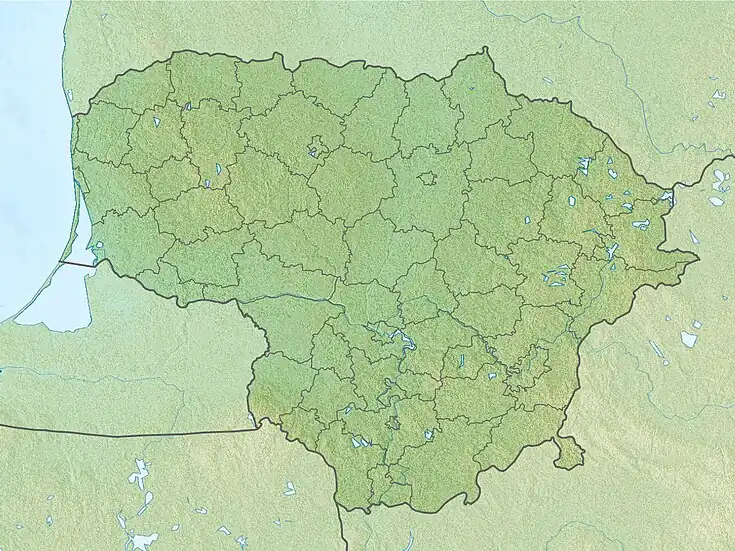
Gallery
See also
- List of towns in Lithuania (Lithuanian: plural – miesteliai, singular – miestelis)
- List of Lithuanian cities in other languages
- Administrative divisions of Lithuania
- Counties (Lithuanian: singular – apskritis, plural – apskritys)
- Municipalities (Lithuanian: plural – savivaldybės, singular – savivaldybė)
- Elderships (or wards) (eldership, ward) (Lithuanian: plural – seniūnijos, singular – seniūnija).
- Seniūnaitija (sub-eldership)
 Lithuania portal
Lithuania portal
Notes and sources
- Population sizes are given according to Department of Statistics to the Government of the Republic of Lithuania (Statistics Lithuania) data for the census of 2001.
- "City rights" means rights to self-government. For older cities this is usually the date when Magdeburg rights were granted. Most dates are obtained from Lithuanian Wikipedia which assembled the information from several different sources. One of the main sources was Population Statistics. This information cannot be completely trusted.
- Counties, municipalities and elderships are given according to Lithuanian Central Internet Gates data.
- Stasys Vaitiekūnas, Elena Valančienė, Lietuvos geografija (Geography of Lithuania), Alma littera, 2004, pages 160-162. ISBN 9955-08-534-7
- Lietuvos Respublikos teritorijos administracinių vienetų ir jų ribų įstatymas (Republic of Lithuania Law on Administrative Units and Their Borders), Seimas law database, June 19, 1994, law no. I-558.
- At the time of the 2001 census, there were 106 cities in Lithuania. the Government of the Republic of Lithuania made these changes:
- Cities with no image of a coat of arms shown do not have one confirmed by the President of Lithuania. Municipalities share coats of arms with their capitals, with the exception of cities which are capitals of more than one municipality (i.e. a city municipality and a district municipality), in which case the city municipality shares the coat of arms with the city, while the district municipality has its own distinct coat of arms. Another notable exception is Trakai town, which has different coat of arms from its municipality (Trakai District Municipality).
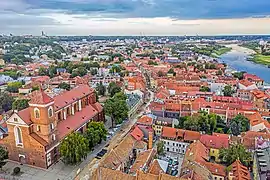




.jpg.webp)

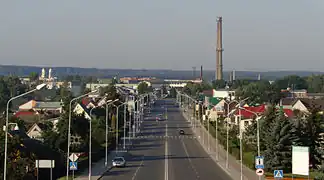
.jpg.webp)
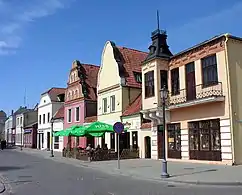
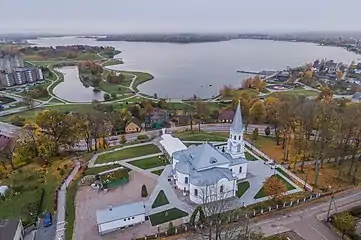

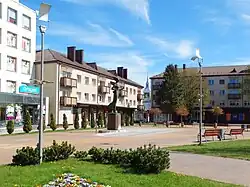
.jpg.webp)




